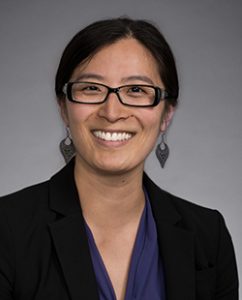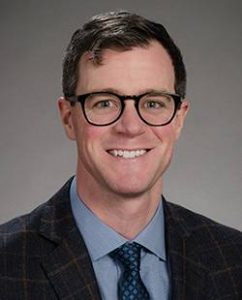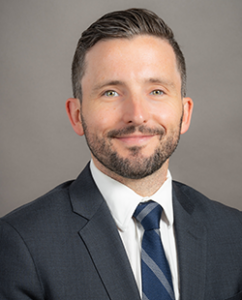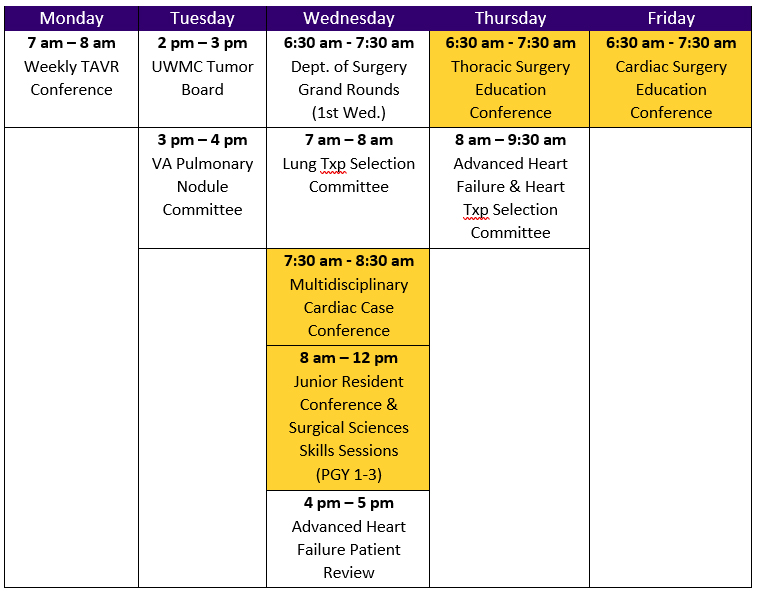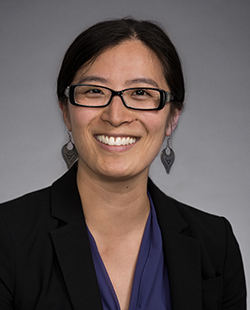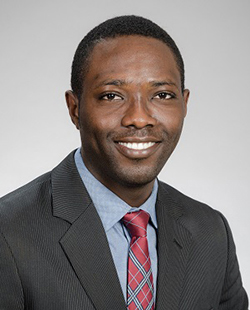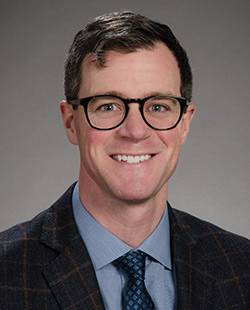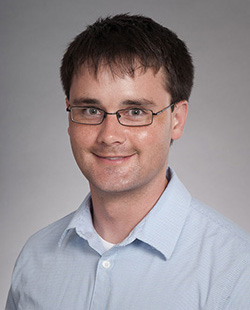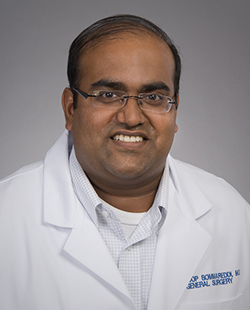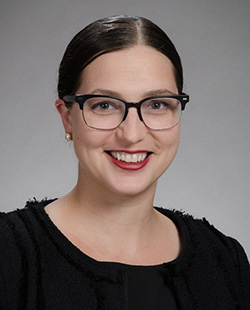Cardiothoracic Surgery-Integrated & 4/3 Programs
Cardiothoracic Surgery-Integrated & 4/3 Programs
About the Program
Established in 2010, the Cardiothoracic Surgery Integrated Residency program is dedicated to producing balanced, well-qualified cardiothoracic surgeons prepared to serve the community through careers in either private practice or academia. With dedicated faculty based at Seattle’s premier medical facilities, the program has been carefully designed to balance training in cardiovascular and thoracic surgery.
The residency is designed to provide residents with focused, hands-on experience divided equally between cardiac and thoracic surgery. While residents are welcome to choose an area of specialty, there are no pre-designated cardiac or thoracic tracks.
Integrated residents will spend their first three years of training (PGY 1-3) completing prerequisite clinical rotations including exposure to general surgery, vascular surgery, critical care, cardiothoracic surgery, echocardiography, and cardiothoracic anesthesia. Following this, senior Integrated residents (PGY 4-6) rotate on cardiothoracic surgery clinical services with fellows in the Cardiothoracic Surgery Fellowship program. In these latter years of training, residents will gain requisite experience in general thoracic, cardiac, congenital cardiac, and foregut surgery as well as end-stage heart and lung disease, including mechanical circulatory support and heart and lung transplantation.
Quick Facts
- Faculty have served as leaders of STS, ABS, ABTS, WTSA, TSDA, ACS, JCTSE, ISHLT, ELSO, and the ACGME Thoracic Surgery Residency Review Committee
- Division has completed 1000+ lung transplants and 900+ heart transplants.
- Average case numbers at graduation: 1575 total cases
Program Director
Associate Professor, Division of Cardiothoracic Surgery
Chief of Thoracic Surgery VA Puget Sound HCS
Associate Program Director
Associate Professor, Division of Cardiothoracic Surgery
Clinical Experience
Integrated Cardiothoracic Surgery residents at the University of Washington receive an unrivaled clinical education. Training alongside nationally and internationally recognized faculty, residents have a robust operative experience in every subspecialty of cardiothoracic surgery from “bread and butter” cases” like CABGs and lobectomies to more complex cases like hybrid aortic aneurysm repair and pulmonary thromboendarterectomy.
What makes the Integrated program at the University of Washington unique is that it is one of the few programs in the country that trains you to be a true Cardiothoracic surgeon. Graduates are equipped to handle the full spectrum of cardiac and thoracic surgical disease. Additionally, as the tertiary and quaternary referral center for the WWAMI region, we care for a diverse patient population, which equates to a more robust clinical experience.
Residents spend their PGY 1-3 years building a foundation of surgical skills on a variety of specifically curated general surgery, vascular surgery, and cardiothoracic surgery rotations including cardiothoracic anesthesiology and echocardiography. The PGY 4-6 years are considered the “senior” years and are dedicated to perfecting technical skills and perioperative management of cardiothoracic surgical patients. Senior residents will primarily rotate on three services – UW Medical Center Thoracic Surgery, UW Medical Center Cardiac Surgery, Kootenai Health, and VA Cardiothoracic Surgery – gaining critical operative experience while working alongside leaders in the field.
Trainees in this program will have graduated autonomy from day one. Working in consultation with our Cardiothoracic Surgery faculty as well as partnering with advanced practice providers and perfusionists, residents in the Integrated Program are integral members of the team and oversee all aspects of perioperative care from the initial clinic visit until discharge, giving them a well-rounded education in clinical training.
Developing technical proficiency is at the core the Integrated Program’s mission. At the University of Washington, Cardiothoracic residents DO the cases, standing on the “surgeon’s side” of the table from day one. Throughout their six years of training residents participate in a myriad of simulation and surgical skills sessions aimed to help trainees hone their skills in everything from robotics to managing adverse intraoperative events.
Training Sites
Integrated Cardiothoracic Residents will rotate at six sites throughout their training.
- The University of Washington Medical Center–Montlake is a tertiary and quaternary care referral site for the WWAMI region and serves as the primary training site for the Integrated Program. Trainees in their PGY 1-3 years will spend about half their time at the UW Medical Center and it is the primary site of practice in the senior years of training.
- The VA Puget Sound Health Care System provides tertiary care to veterans throughout the region. Residents will rotate on the General Surgery Service in their intern year and for 2-3 months a year on the Cardiothoracic Surgery Service in their senior years of training. (Located 7.5 miles south of UW Medical Center-Montlake)
- Seattle Children’s Hospital was founded over 100 years ago and serves families across the WWAMI region regardless of their ability to pay. Residents will rotate on the General Pediatric Surgery Service in their PGY 1 and PGY 3 years and will have the option of rotating on the Congenital Cardiac Service in their senior years. (Located 2.0 miles west of UW Medical Center-Montlake)
- Harborview Medical Center serves as the only Level 1 trauma center for the entire WWAMI region. Residents will rotate on a myriad of services at this site in the PGY 1-3 years and are exposed to all aspects of trauma, critical care, and vascular surgery. (Located approximately 5 miles south of UW Medical Center-Montlake)
- University of Washington Medical Center–Northwest is a community hospital located in North Seattle. Integrated residents rotate as the senior resident on the General Surgery Service in their PGY 3 year of training. This rotation is designed to allow trainees to hone their laparoscopic and open surgical skills on “bread and butter” general surgery cases as well as learn to be the “chief” of a service. (Located approximately 6 miles north of UW Medical Center-Montlake)
- Kootenai Health is a regional medical referral center, 397 bed hospital in Coeur d’Alene, Idaho. This away, community rotation provides PGY 4 trainees with the kind of experiences CT surgeons will encounter in community practice.
Rotations
The curriculum and rotations of the PGY 1-3 years are focused on building a strong foundation in surgical skills.
Integrated residents will rotate on general surgery, vascular surgery, cardiothoracic surgery (highlighted rotations below), anesthesia, and ECHO services across six sites of training to attain the prerequisite experience in cardiothoracic surgery. These rotations will facilitate the completion of the ABTS Junior Case Requirements.
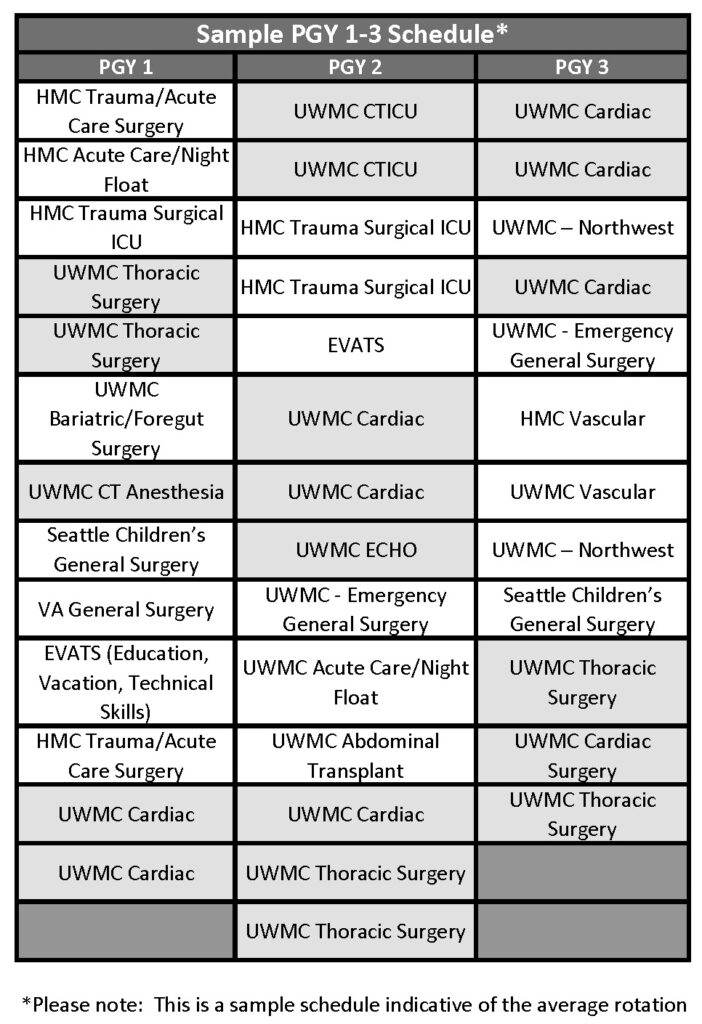
The PGY 4-6 years make up the core of cardiothoracic surgery training and time is split between the UW Medical Center Thoracic, UW Medical Center Cardiac, VA, and Kootenai Health services. These final three years of training are intensive, and the Integrated resident is fully immersed in cardiothoracic surgery, working alongside the Traditional fellows (one per year) to truly lead the team and drive patient care. On these rotations, trainees will work one-on-one with Cardiac and Thoracic faculty to master all aspects of Cardiac and Thoracic surgery.
Cardiac Surgery
- Coronary Revascularization
- Valvular Heart Disease
- Endocarditis
- Aortic Surgery
- Advanced Heart Failure
- Mechanical Circulatory Support (MCS)/ECLS
- Cardiac Transplantation
- Structural Heart Disease/Transcatheter Valve Replacement
- Adult Congenital Surgery
Thoracic Surgery
- General Thoracic Oncology
- End-stage Lung Disease/Lung Volume Reduction Surgery (LVRS)
- Tracheal Reconstruction
- Esophageal Surgery
- Interventional Bronchoscopy (including Rigid Bronchoscopy)
- Chest Wall Reconstruction
- Mediastinal and Pleural Disease
- VATS and Robotic Surgery
- Lung Transplantation
- Pulmonary Thromboendarterectomy
- Extracorporeal Life Support
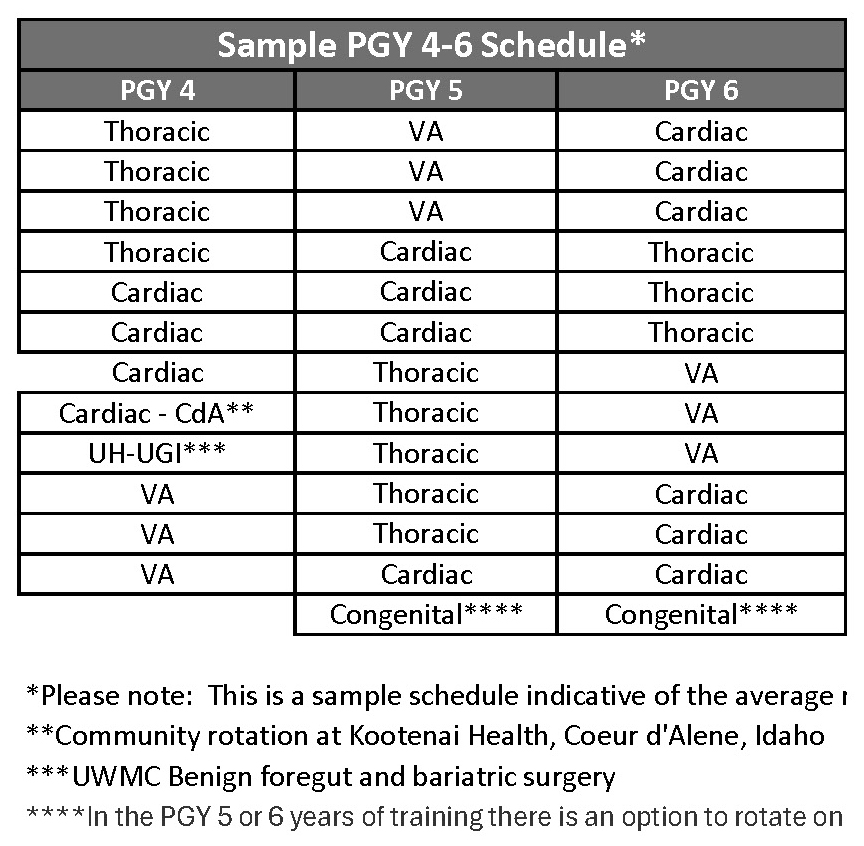
Conferences
Each week residents participate in didactic sessions geared towards establishing and reinforcing a comprehensive understanding of cardiothoracic surgery. The weekly Thoracic Surgery and Cardiac Surgery Education Conferences follow the Society of Thoracic Surgeons’ thoracic surgery curriculum, which UW faculty and residents played a key role in helping to establish. Junior Resident Conference (JRC) occurs every first, third, and fifth Wednesday of the month. This conference is designed to give junior residents a primer in basic cardiothoracic surgery skills and knowledge and to create an opportunity for residents to interact with cardiothoracic faculty.
Sample topics include:
- Coronary Physiology
- Congenital Cardiac Anatomy
- Electrophysiology and Pacemakers 101
- ECLS Skills Sessions
- Basic Echocardiography
- Heart Failure for the Cardiothoracic Surgeon
- Cardiopulmonary Bypass
- Management of Acute Aortic Dissections
- Bedside Chest Procedures
- Thoracic Radiology
- Pulmonary Function Testing
- Post-op Care of the Cardiothoracic Surgery Patient
- Surgical Approach to Lung Cancer
- Surgical Approach to Esophageal Cancer
- Management Mediastinal Masses
- Thoracic Analgesia
Cardiothoracic Surgery In-house Bootcamp
This year was the division’s initial in-house bootcamp for our new trainees as well as current trainees at the start of the academic year. Topis included; ICU management of the post-op cardiac surgery patient; Introduction to the CBP circuit; Bronchoscopy- Flexible and Rigid / Awake Bronch / stenting/ dilation; MCS – ECMO; VAD management and training; Cannulation, CABG, and AVR simulation.

